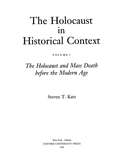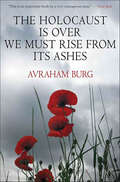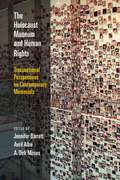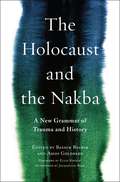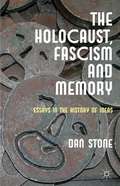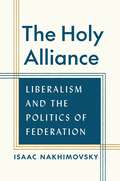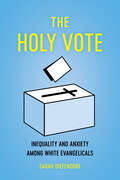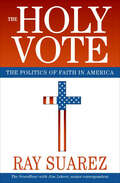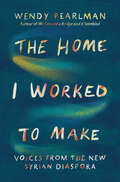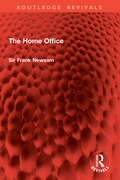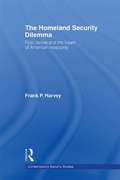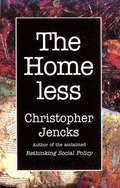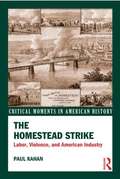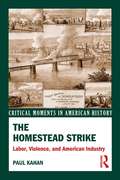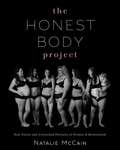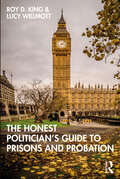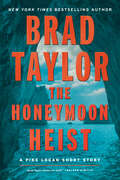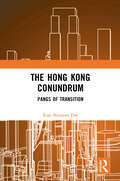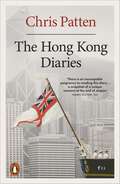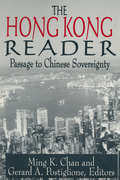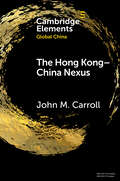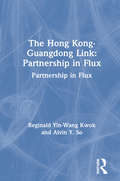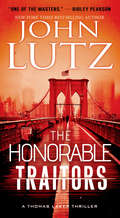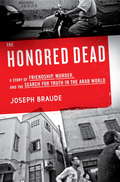- Table View
- List View
The Holocaust In Historical Context: Volume 1, The Holocaust and Mass Death Before the Modern Age
by Steven T. KatzWith this volume, Steven T. Katz initiates the provocative argument that the Holocaust is a singular event in human history. Unlike any previous work on the subject, The Holocaust in Historical Context maintains that the Holocaust is the only example of true genocide--a systematic attempt to kill all the members of a group--in history. <p><p> In a richly documented, subtly argued, and amazingly wide-ranging comparative historical and phenomenological analysis, Katz explores the philosophical and historiographical implications of the uniqueness of the Holocaust. After he establishes the nature of genocide, Katz examines other occasions of mass death to which the Holocaust is regularly compared from slavery in the ancient world to the medieval persecution of heretics, from the depopulation of the New World to the Armenian massacres during World War I, and from the Gulag to Cambodia. <p><p> In the first of three volumes, Katz, after setting the groundwork for his analysis with four chapters dealing with essential methodological issues, begins his comparative case studies with slavery in the ancient Greek and Roman world, and continues with such subjects as medieval antisemitism, the European witch craze, the medieval wars of religion, the medieval persecution of homosexuals, and the French campaign against Huguenots. <p><p>Throughout this investigation of pre-modern Jewish and non-Jewish history, Katz looks at the ways in which the Holocaust has precedents and parallels, and in what way it stands alone as a singular, highly distinctive historical event.
The Holocaust Is Over; We Must Rise From its Ashes
by Avraham BurgModern-day Israel, and the Jewish community, are strongly influenced by the memory and horrors of Hitler and the Holocaust. Burg argues that the Jewish nation has been traumatized and has lost the ability to trust itself, its neighbors or the world around it. He shows that this is one of the causes for the growing nationalism and violence that are plaguing Israeli society and reverberating through Jewish communities worldwide. Burg uses his own family history--his parents were Holocaust survivors--to inform his innovative views on what the Jewish people need to do to move on and eventually live in peace with their Arab neighbors and feel comfortable in the world at large. Thought-provoking, compelling, and original, this book is bound to spark a heated debate around the world.
The Holocaust Museum and Human Rights: Transnational Perspectives on Contemporary Memorials (Pennsylvania Studies in Human Rights)
by American PhilosoInterrogates the global, and often controversial, phenomenon of Holocaust and human rights museumsSpanning six continents—Europe, Australia, Africa, Asia, North America, and South America—this edited collection offers a comparative, transnational study of Holocaust and human rights museums that foregrounds the overlapping and often contested work these institutions do in narrating and memorializing histories of genocide and human rights abuses for a public audience. Museums that link the Holocaust with social justice, human rights, and genocide prevention have been founded in many countries—for example, the Kazerne Dossin Memorial Museum in Belgium, the Anne Frank House in the Netherlands, and the Johannesburg Holocaust and Genocide Centre in South Africa—making Holocaust and human rights museums a global phenomenon. It is not uncommon for these institutions to court controversy by linking the Holocaust to human rights issues in their locales and abroad. Some begin from a “Holocaust core” and extrapolate from this history to address broader concerns, while others integrate the Holocaust as “a” or, at times, “the” case study par excellence of human rights abuses. Other institutions that may not explicitly focus on the Holocaust continue to engage these representational practices to highlight other instances of genocide and human rights abuses.The case studies in this book illuminate the convergences between Holocaust and human rights museums in their demands for social justice and reparation, educational and activist purpose, design principles, and curatorial choices. But it also shows how these museums can also be sites of contestation around how stories of suffering, courage, and survival are told; whose stories are prioritized; and who is consulted. Although Holocaust museums were once the most influential form of representation of human rights issues in the international museum and heritage fields, they are now in dialogue—visually, spatially, methodologically—with museums and memorial sites concerned with human rights more broadly. Interrogating debates in both museology and Holocaust memory studies, this volume reveals how institutions dedicated to these concerns have become active and influential contributors to local, national, and transnational dialogues about human rights.Contributors: Avril Alba, Brook Andrew, Jennifer Barrett, Jennifer Carter, Danielle Celermajer, Steven Cooke, Donna-Lee Frieze, Shirli Gilbert, Sulamith Graefenstein, Christoph Hanzig, Vannessa Hearman, Rosanne Kennedy, Marcia Langton, Edwina Light, Wendy Lipworth, A. Dirk Moses, Tali Nates, Jessica Neath, Michael Robertson, Amy Sodaro, Garry Walter.
The Holocaust and the Nakba: A New Grammar of Trauma and History (Religion, Culture, and Public Life #39)
by Jacqueline Rose Omer Bartov Gil Anidjar Alon Confino Yehouda Shenhav Mark Levene Hannan Hever Refqa Abu-Remaileh Omri Ben-Yehuda Tal Ben-Zvi Yochi Fischer Honaida Ghanim Mustafa Kabha Nadim Khoury Amnon Raz-Krakotzkin Raef ZreikIn this groundbreaking book, leading Arab and Jewish intellectuals examine how and why the Holocaust and the Nakba are interlinked without blurring fundamental differences between them. While these two foundational tragedies are often discussed separately and in abstraction from the constitutive historical global contexts of nationalism and colonialism, The Holocaust and the Nakba explores the historical, political, and cultural intersections between them. The majority of the contributors argue that these intersections are embedded in cultural imaginations, colonial and asymmetrical power relations, realities, and structures. Focusing on them paves the way for a new political, historical, and moral grammar that enables a joint Arab-Jewish dwelling and supports historical reconciliation in Israel/Palestine.This book does not seek to draw a parallel or comparison between the Holocaust and Nakba or to merely inaugurate a “dialogue” between them. Instead, it searches for a new historical and political grammar for relating and narrating their complicated intersections. The book features prominent international contributors, including a foreword by Lebanese novelist Elias Khoury on the centrality of the Holocaust and Nakba in the essential struggle of humanity against racism, and an afterword by literary scholar Jacqueline Rose on the challenges and contributions of the linkage between the Holocaust and Nakba for power to shift and a world of justice and equality to be created between the two peoples. The Holocaust and the Nakba is the first extended and collective scholarly treatment in English of these two constitutive traumas together.
The Holocaust, Fascism and Memory
by Dan StoneFrom interpretations of the Holocaust to fascist thought and anti-fascists' responses, this book tackles topics which are rarely studied in conjunction. This is a unique collection of essays on a wide variety of subjects, which contributes to understanding the roots and consequences of mid-twentieth-century Europe's great catastrophe.
The Holy Alliance: Liberalism and the Politics of Federation
by Isaac NakhimovskyA major new account of the post-Napoleonic Holy Alliance and the promise it held for liberalsThe Holy Alliance is now most familiar as a label for conspiratorial reaction. In this book, Isaac Nakhimovsky reveals the Enlightenment origins of this post-Napoleonic initiative, explaining why it was embraced at first by many contemporary liberals as the birth of a federal Europe and the dawning of a peaceful and prosperous age of global progress. Examining how the Holy Alliance could figure as both an idea of progress and an emblem of reaction, Nakhimovsky offers a novel vantage point on the history of federative alternatives to the nation state. The result is a clearer understanding of the recurring appeal of such alternatives—and the reasons why the politics of federation has also come to be associated with entrenched resistance to liberalism&’s emancipatory aims.Nakhimovsky connects the history of the Holy Alliance with the better-known transatlantic history of eighteenth-century constitutionalism and nineteenth-century efforts to abolish slavery and war. He also shows how the Holy Alliance was integrated into a variety of liberal narratives of progress. From the League of Nations to the Cold War, historical analogies to the Holy Alliance continued to be drawn throughout the twentieth century, and Nakhimovsky maps how some of the fundamental political problems raised by the Holy Alliance have continued to reappear in new forms under new circumstances. Time will tell whether current assessments of contemporary federal systems seem less implausible to future generations than initial liberal expectations of the Holy Alliance do to us today.
The Holy Reich
by Richard Steigmann-GallAnalyzing the previously unexplored religious views of the Nazi elite, Richard Steigmann-Gall argues against the consensus that Nazism as a whole was either unrelated to Christianity or actively opposed to it. He demonstrates that many participants in the Nazi movement believed that the contours of their ideology were based on a Christian understanding of Germany's ills and their cure. A program usually regarded as secular in inspiration - the creation of a racialist 'people's community' embracing antisemitism, antiliberalism and anti-Marxism - was, for these Nazis, conceived in explicitly Christian terms. His examination centers on the concept of 'positive Christianity,' a religion espoused by many members of the party leadership. He also explores the struggle the 'positive Christians' waged with the party's paganists - those who rejected Christianity in toto as foreign and corrupting - and demonstrates that this was not just a conflict over religion, but over the very meaning of Nazi ideology itself.
The Holy Vote: Inequality and Anxiety among White Evangelicals
by Sarah DiefendorfThrough two years of ethnographic fieldwork at a megachurch, sociologist Sarah Diefendorf investigates the ways in which the evangelical church is working to grow during a time in which cultural shifts are leading young people to leave religion behind. In order to expand, the church has revisited topics long understood as external threats to the organization, such as feminism, gender equality, racial inclusivity, and queer life—topics Diefendorf classifies as the "imagined secular" in the minds of evangelicals.The Holy Vote shows, however, that the church continues to uphold already privileged identities even as it reworks its messages to appear more welcoming, offering insight into how White evangelical understandings about sex and families have shaped a political movement that has helped remake the Republican Party and transform American politics. In this enlightening work, Diefendorf highlights the complex origins of these understandings and considers their intersections with contemporary culture and enduring social inequalities.
The Holy Vote: The Politics of Faith in America
by Ray SuarezNot since the Civil War has the United States been so polarized, politically and ideologically. At the heart of this fracture is a fascinating, paradoxical marriage between our country's politics and religions.In The Holy Vote, Ray Suarez explores the advent of this polarization and how it is profoundly changing the way we live our lives. With hands-on reporting, Suarez explores the attitudes and beliefs of the people behind the voting numbers and how the political divide is manifesting itself across the country. The reader will come to a greater understanding of what Americans believe, and how this belief structure fuels the debates that dominate the issues on our evening news broadcasts.
The Home I Worked to Make: Voices from the New Syrian Diaspora
by Wendy PearlmanWar forced millions of Syrians from their homes. It also forced them to rethink the meaning of home itself. In 2011, Syrians took to the streets demanding freedom. Brutal government repression transformed peaceful protests into one of the most devastating conflicts of our times, killing hundreds of thousands and displacing millions. The Home I Worked to Make takes Syria’s refugee outflow as its point of departure. Based on hundreds of interviews conducted across more than a decade, it probes a question as intimate as it is universal: What is home? With gripping immediacy, Syrians now on five continents share stories of leaving, losing, searching, and finding (or not finding) home. Across this tapestry of voices, a new understanding emerges: home, for those without the privilege of taking it for granted, is both struggle and achievement. Recasting “refugee crises” as acts of diaspora-making, The Home I Worked to Make challenges readers to grapple with the hard-won wisdom of those who survive war and to see, with fresh eyes, what home means in their own lives.
The Home Office (Routledge Revivals)
by Frank NewsamFirst published in 1954, The Home Office presents a comprehensive overview of the structure and functions of the Home Office of the Government of the United Kingdom. Sir Frank Newsam describes the principles which underlie the part played by the Home Office in the preservation of order and the maintenance of civil liberty. The book provides an account of the balanced relationships which exist between the Home Office and the local authorities in administering the various services.It discusses themes like the Home Secretary and his functions; the business of the Home Office; public well-being and public safety; the royal prerogative of mercy; nationality and naturalization; administration of justice; and the international work of the Home Office. This is a must read for students of British politics and public administration.
The Homeland Security Dilemma: Fear, Failure and the Future of American Insecurity (Contemporary Security Studies)
by Frank P. HarveyThis book explores the paradox of the ‘security dilemma’ in International Relations, as applied to the post-9/11 context of homeland security. The book's central argument can be summed up by the following counterintuitive thesis: the more security you have, the more security you will need. It argues that enhancing security does not make terrorism more likely, but rather it raises public expectations and amplifies public outrage after subsequent failures. The book contests that this dilemma will continue to shape American, Canadian and British domestic and international security priorities for decades. In exploring the key policy implications resulting from this, the book highlights the difficulty in finding a solution to this paradox, as the most rational and logical policy options are part of the problem. This book will be of interest to students of Homeland Security, Security Studies, US politics, and IR in general.
The Homeless
by Christopher JencksHow widespread is homelessness, how did it happen, and what can be done about it? These are the questions explored by Christopher Jencks, America's foremost analyst of social problems. Jencks examines the standard explanations and finds that the deinstitutionalization of the mentally ill, the invention of crack cocaine, rising joblessness among men, declining marriage rates, cuts in welfare benefits, and the destruction of skid row have all played a role. Changes in the housing market have had less impact than many claim, however, and real federal housing subsidies actually doubled during the 1980s. Not confining his mission to studying the homeless, Jencks proposes several practical approaches to helping the homeless.
The Homestead Strike: Labor, Violence, and American Industry
by Paul KahanThis book illuminates the tense relationship between labor, capital, and government in the pivotal moment between Reconstruction and the Progressive Era. It talks about the background of the Homestead Strike so that readers understand not only what happened, but why.
The Homestead Strike: Labor, Violence, and American Industry (Critical Moments in American History)
by Paul KahanOn July 6, 1892, three hundred armed Pinkerton agents arrived in Homestead, Pennsylvania to retake the Carnegie Steelworks from the company's striking workers. As the agents tried to leave their boats, shots rang out and a violent skirmish began. The confrontation at Homestead was a turning point in the history of American unionism, beginning a rapid process of decline for America’s steel unions that lasted until the Great Depression. Examining the strike’s origins, events, and legacy, The Homestead Strike illuminates the tense relationship between labor, capital, and government in the pivotal moment between Reconstruction and the Progressive Era. In a concise narrative, bolstered by statements from steelworkers, court testimony, and excerpts from Carnegie's writings, Paul Kahan introduces students to one of the most dramatic and influential episodes in the history of American labor.
The Honest Body Project: Real Stories and Untouched Portraits of Women & Motherhood
by Natalie McCainOnly 4 percent of women around the world consider themselves to be beautiful, according to research done by Dove, and twenty million women suffer from significant eating disorders at some point in their life—The Honest Body Project was created to combat this tragic problem of poor body image in our society. Founded by photographer Natalie McCain, this project is opening the eyes of women around the world and helping them to see the beauty both outside and inside of themselves. It is a collection of black and white portraits and stories, raw and untouched, from hundreds of women who have bared their hearts and souls to be a part of the project. Natalie tastefully photographs the women in their underwear, showing off their natural shapes and “imperfections.” There is no editing done after the fact, and the natural beauty of these women—from all backgrounds and walks of life—shines through the lens. Together, they create a beautiful, honest picture of both motherhood and what it means to be a woman. Topics include body image issues, breast cancer, depression (postpartum and otherwise), anxiety, bottle feeding versus breast feeding, aging, and more.The Honest Body Project is a breath of fresh air, breaking down walls and helping women learn that they are not alone in their hardships. It wants to help women everywhere contribute to a better world, and to learn to love themselves and appreciate their bodies for what they are: perfectly imperfect. It is time to celebrate the true form of women.
The Honest Politician’s Guide to Prisons and Probation
by Roy D. King Lucy WillmottThrough a comprehensive analysis of legislative and organisational changes and interviews with all the key players, The Honest Politician’s Guide to Prisons and Probation provides an authoritative account of the crisis which has gradually engulfed the prison and probation services since 1991. Setting out the nature and extent of the crisis, King and Willmott show how the Woolf agenda was overridden in a process of political churn, through explorations of the Conservative government until 1997, New Labour from 1997 to 2010 and the Coalition and Conservative governments since 2010. Uniquely, interviews with all surviving Home Secretaries and Justice Secretaries of the period include insightful and candid reflections upon their time in office, and how they saw the future. Views from both inside and outside the prisons and probation services are also explored, based on interviews with the Director Generals of the Prison Service and of the new National Probation Service, Chief Inspectors of Prisons and Probation and the four most recent Lord Chief Justices, including Lord Woolf himself. Concluding by drawing on this collective wisdom, King and Willmott set out what is needed for an effective and sustainable future. It is essential reading not just for those in Westminster, but also for practitioners in criminal justice, advocacy organisations, thinktanks and scholars and students in Criminology, Criminal Justice, British Politics and Public Policy.
The Honeymoon Heist (Pike Logan)
by Brad TaylorNew York Times bestselling author and former Special Forces officer Brad Taylor’s thrilling new short story sets Pike Logan and Jennifer Cahill on Italy’s beautiful Amalfi Coast for their long-delayed honeymoon with their daughter, Amena—where they encounter art thieves with ties to the underworld . . .Between the delectable meals, the gorgeous Mediterranean seaside, and historical sites, Pike and Jennifer are enjoying their time with Amena in the Italian village of Positano, grateful for the reprieve from their day jobs—protecting U.S. interests from terrorist threats. But their relaxing vacation runs into trouble when Amena and Pike uncover what appears to be a priceless Renaissance painting hidden in a grotto and soon find themselves in the center of a black market art scheme.A powerful Italian businessman and suspected crime lord had arranged to take possession of the rare, deeply significant Caravaggio artwork in the cave through less-than-legal means, and hadn’t counted on the trio of Americans interrupting his plot. He is determined to leave no witnesses . . . but when he dares to threaten Pike and his family, he learns how dangerous they truly are . . .
The Hong Kong Conundrum: Pangs of Transition
by Rup Narayan DasThe peaceful surrender of Hong Kong to China on the midnight of 30 June 1997 after almost one hundred and fifty-six years of colonial rule was unique in the annals of history. Rarely before had one power surrendered a rich prize to another. The credit for finding a solution to the peaceful reunification of Hong Kong, a capital enclave, with mainland China, a socialist country, through the formula of ‘one country, two systems’ goes to Deng Xiaoping, China’s most pragmatic leader. Deng, however, breathed his last before Hong Kong’s merger with the mainland. This book attempts to encapsulate the history of Hong Kong ever since the territory was acquired by Great Britain through what the Chinese call ‘the unequal treaties’, the evolution of the colonial administration in Hong Kong, its emergence as a commercial centre and financial hub, the protracted Sino-British negotiation leading to the signing of the Joint Declaration and the Basic Law, the democracy debate in Hong Kong, the ethnic Indians in Hong Kong and the pangs of transition. Print edition not for sale in South Asia (India, Sri Lanka, Nepal, Bangladesh, Pakistan and Bhutan).
The Hong Kong Diaries
by Chris PattenThe diaries of the last British Governor of Hong Kong, published on the 25th anniversary of the handoverIn June 1992 Chris Patten went to Hong Kong as the last British governor, to try to prepare it not (as other British colonies over the decades) for independence, but for handing back in 1997 to the Chinese, from whom most of its territory had been leased 99 years previously. Over the next five years he kept this diary, which describes in detail how Hong Kong was run as a British colony and what happened as the handover approached. The book gives unprecedented insights into negotiating with the Chinese, about how the institutions of democracy in Hong Kong were (belatedly) strengthened and how Patten sought to ensure that a strong degree of self-government would continue after 1997. Unexpectedly, his opponents included not only the Chinese themselves, but some British businessmen and civil service mandarins upset by Patten's efforts, for whom political freedom and the rule of law in Hong Kong seemed less important than keeping on the right side of Beijing. The book concludes with an account of what has happened in Hong Kong since the handover, a powerful assessment of recent events and Patten's reflections on how to deal with China - then and now.
The Hong Kong Reader: Passage to Chinese Sovereignty
by Ming K. Chan Gerard A. PostiglioneThis paperback reader provides the student and general reader with easy access to the major issues of the Hong Kong transition crisis. Contributors include both editors, as well as Frank Ching, Berry F. Hsu, Reginald Yin-wang Kwok, Peter Kwong, Julian Y.M. Leung, Ronald Skeldon, Alvin Y. So, Yun-wing Sung, and James T.H. Tang - the majority of whom live and work in Hong Kong and experience the transition firsthand, personally and professionally.
The Hong Kong-China Nexus: A Brief History (Elements in Global China)
by John M CarrollThe Occupy Central/Umbrella Movement of 2014 and the anti-extradition protests of 2019 revealed how much Hong Kong's relationship with mainland China has deteriorated since the former British colony returned to Chinese sovereignty in July 1997. With mutual distrust and suspicion at an all-time high, many Hong Kong people have become increasingly hostile toward the Chinese government and the mainland in general, identifying themselves as Hongkongers rather than as Chinese. Yet, as John Carroll shows, for more than 150 years, colonial Hong Kong and China not only coexisted with but benefited each other, even during the anti-imperialist campaigns of the Republican and Communist eras. The porous boundary between Hong Kong and China enabled the two to use each other economically, politically, socially, and culturally. The Hong Kong–China nexus, although firmly embedded in global dynamics of colonialism, Cold War politics, and capitalist expansion, defies many common assumptions about nationalism, colonialism, and decolonization.
The Hong Kong-Guangdong Link: Partnership in Flux (Hong Kong Becoming China Ser.)
by Alvin Y. So Reginald Yin-Wang KwokThis text focuses on the relationship of Hong Kong with the adjacent Chinese province Guangdong, the territories most directly involved in the 1997 transfer of Hong Kong to Chinese rule. The socio-economic, political and cultural impact of this crucial link and the implications for the future of both Hong Kong and China are studied. A multi-disciplinary approach is taken to examine the complexity of economic, political and cultural transformation of the Hong Kong-Guangdong link and this book presents a historical perspective to trace the long-term structural transformation. The dynamics of the integration process between the two territories is also explored.
The Honorable Traitors (A Thomas Laker Thriller #1)
by John LutzJOHN LUTZ IS . . . “A MAJOR TALENT.” —John Lescroart “AMONG THE BEST.” —San Diego Union “IN RARE FORM.” —The New York Times Book Review THE UNKNOWN SPY Officially, Thomas Laker is an employee of the NSA. His real employer, known as the Gray Outfit, is not listed—anywhere. When a Washington, D.C., insider is killed in a bomb explosion, Laker teams up with cryptographer Ava North on a desperate search for clues. The only thing certain is that another act of terrorism is imminent. Delving into the dangerous past when America was drawn into global conflict, they discover one of history’s greatest—and deadliest—secrets. In the wrong hands it can unleash unimaginable destruction. Now, to keep his homeland from plunging into its darkest hour, Laker will have to defend everything he believes in . . . “LUTZ OFFERS UP A HEART-POUNDING ROLLER COASTER OF A TALE.” —Jeffery Deaver
The Honored Dead: A Story of Friendship, Murder, and the Search for Truth in the Arab World
by Joseph BraudeThe Arab Islamic world is known for religious extremism, ethnic conflicts, and, now, the overthrow of seemingly unshakable regimes--but if anything has become clear, it's that our understanding of the region remains shrouded and incomplete. The seeds of revolution, radicalism, and--possibly--reform are buried in the individual stories of millions of people whose lives determine the fates of their societies, people whose motivations are as common, and as strange, as our own.Here is one of those stories--and the story of how this world is being transformed, one life at a time. Joseph Braude is the first Western journalist ever to secure embed status with an Arab security force, assigned to a hardened unit of detectives in Casablanca who handle everything from busting al-Qaeda cells to solving homicides. One day he's given the file for a seemingly commonplace murder: a young guard at a warehouse killed in what appears to be a robbery gone wrong. Braude is intrigued by the details of the case: the sheer brutality of the murder, the identities of the accused--a soldier--and the victim, a shadowy migrant with links to a radical cleric, and the odd location: a warehouse owned by a wealthy member of one of the few thriving Jewish communities in the Arab world. After interviewing the victim's best friend, who tearfully insists that the true story of the murder has been covered up by powerful interests, Braude commits to getting to the bottom of it.Braude's risky pursuit of the shocking truth behind the murder takes him from cosmopolitan Marrakesh to the proud Berber heartland, from the homes of the wealthiest and most powerful people in the country to the backstreets of Casablanca, where migrants come to make fortunes, jihad, and trouble, but often end up just trying to survive with dignity. The Honored Dead is a timely and riveting mystery about a society in transition, the power of the truth, and the irrepressible human need for justice.From the Hardcover edition.
